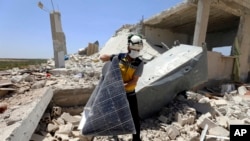As the Syrian civil war passes the 11-year mark, the U.N. secretary-general said Friday that courage must be shown to reach a political settlement.
“We cannot fail the Syrian people. The conflict must cease,” Antonio Guterres said in a statement. “International humanitarian law must be respected.”
The U.N. chief called on all parties to “meaningfully engage” in the U.N.-facilitated political process.
“We must choose peace,” he said.
Arab Spring
Entire cities have been razed and infrastructure destroyed since the Syrian government began a crackdown on teenage boys who scrawled anti-government graffiti on a school wall in the southwestern town of Daraa in spring 2011.
President Bashar Assad’s regime took a strong stance against a growing protest movement in his country, as the popular uprisings that came to be known as the Arab Spring began toppling dictators in Egypt, Tunisia and Libya.
“The destruction that Syrians have endured is so extensive and deadly that it has few equals in modern history,” Guterres said. “There must be no impunity.”
The crackdown led to all-out insurgency and a civil war that has ruined the lives of millions of Syrians. In a country of about 22 million people, the conflict has displaced nearly 7 million inside the country and sent an additional 6.6 million fleeing to safety in neighboring countries and Europe.
The U.N. says at least 13.4 million Syrians need humanitarian assistance and protection inside the country.
In 2015, it appeared Assad’s government might fall, but Moscow’s protection of Damascus from international sanctions at the U.N. Security Council and then its military support has kept the war grinding on.
“In a continuing pattern documented by the Commission for years, pro-government forces — including Syrian and, since September 2015, also Russian forces, operating side by side — have continued to indiscriminately bomb densely populated areas in the northwest,” Paulo Pinheiro, chair of the Independent International Commission of Inquiry on Syria, said Wednesday.
Pinheiro said attempts by the parties to resolve the conflict militarily have led to massive human rights violations and “the commission of almost every crime against humanity” and war crimes.
That includes a series of government-launched chemical and gas attacks against civilians starting from at least 2013, and the siege and starvation of opposition-held cities.
The country has also been fertile ground for armed groups and terrorists, including the Islamic State group.
Syria, once a lower-middle-income country, is now mired in an economic crisis that has left 90% of its population living in poverty and dependent on international food aid.
In 2018, the U.N. estimated that 400,000 had died as a result of the fighting. It has since given up trying to verify deaths. The commission of inquiry says more than 100,000 Syrians are also missing or forcibly disappeared.




